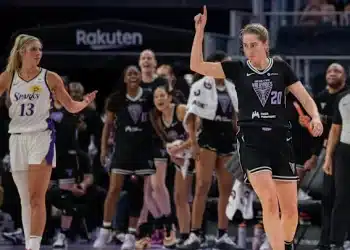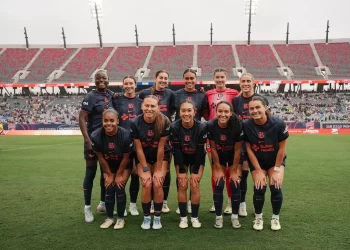By: Zachary Draves
Just 24 hours after we commemorated the 50th anniversary of the passage of Title IX, America took a profound step backward in the pursuit of equality. The Supreme Court took the extraordinary step in overturning Roe v Wade, the landmark ruling from 1973 that granted a woman’s right to choose whether or not to terminate a pregnancy. This decision will send the issue of reproductive rights back to the states and already twenty-two are on track to implement strong restrictions if not outright bans.
This was years in the making but once it went down it rocked many to the core and that included the world of sports. Athletes, coaches, teams, and leagues such as the NBA, WNBA, and NWSL took to social media, press conferences, and issued official statements categorically condemning this ruling.
Tennis legend and activist Billie Jean King said “it is a sad day in America”. USWNT star and fellow activist Megan Rapinoe spoke of her frustrations in a ten-minute zoom press conference in which she said of the decision that “I think the cruelty is the point”. At Wimbledon, Tennis superstar CoCo Gauff said “we’re almost going backwards”.
Male athletes such as LeBron James retweeted a post from former President Barack Obama which spoke at great length about the ramifications of this decision plus putting out a call to action. Cincinnati Bengals Quarterback Joe Burrow issued a very detailed Instagram post explaining his support for this fundamental human right.
The Women’s Sports Foundation, the nation’s leading women’s sports advocacy group founded by King in 1974, issued the following statement.
— Women's Sports Foundation (@WomensSportsFdn) June 24, 2022
The outrage is palpable and for good reason. The stripping away of a woman’s right to make her own choices when it comes to her body will make life particularly more difficult especially in those twenty-two states that now have the green light to criminalize abortion. For women who want to play sports, they are now in a precarious predicament because a lack of access to reproductive health care has the potential to compromise their futures in sports and society.
Nobody understands that more than former Olympic swimmer Crissy Perham. As a 19-year-old college student at the University of Arizona, she found herself unexpectedly pregnant and she made the gut-wrenching decision to have an abortion. Eventually, she would make it to the 1992 Barcelona Olympics winning two gold medals in the Women’s 400 freestyle relay and 400 medley relay as well as a silver in the Women’s 100m butterfly. Today she is a mother of two and a staunch advocate for women’s reproductive rights.
She joined alongside King and Rapinoe as part of a group of 500 women athletes in issuing a historic amicus brief in the Dobbs vs Jackson Women’s Health Organization case in outlining their support for reproductive rights within the context of athletics.
“Mandating people to have a baby that is not wanted will mean fewer opportunities to continue education, continue athletics, or continue being a member of the workforce,” she said. “It will strain families, particularly people of color without means to pay for childcare, food, housing, healthcare, etc.”
Keep in mind that in those anti-choice states such as Mississippi have some of the worst rankings in the nation when it comes to health care. According to the Commonwealth Fund, Mississippi comes in last out of all 50 states including the District of Columbia in overall state health performance. Furthermore, they have the highest infant mortality rate plus rank forty-ninth when in affordable child care.
So at this point, it is safe to say that if a woman wants to pursue sports, states like Mississippi have the potential to hamper her endeavors if she happens to find herself unexpectedly pregnant or the victim of rape and incest. Therefore, she will be forced to carry that pregnancy to term with inadequate social support and won’t be able to make it to classes or practice. As a result, her scholarship could be taken away and opportunities are gone.
With access to birth control and contraception on the table as noted by Justice Clarence Thomas concurring opinion, we may be seeing the ongoing assault on reproductive rights for years to come.
“Anyone with a uterus should have the opportunity to decide how that organ gets used, if at all” said Perham. “Reproductive healthcare includes contraception which is already being tossed around as the next way to regulate half the population. This is about a minority controlling other peoples’ bodies. It’s not right. It’s not freedom.”
For millions of women and girls, sports is the epitome of women’s liberation. The ability to display their strength, vitality, and unapologetic spirit and doing so on one’s own terms. Free from the rigid constraints of traditional gender roles. Sports bring out the best in who we are when we give everyone the opportunity to play. Now that basic premise is under siege and we cannot let that happen.
It’s time for us to step up to the plate with the game on the line now more than ever.


 NFL
NFL





